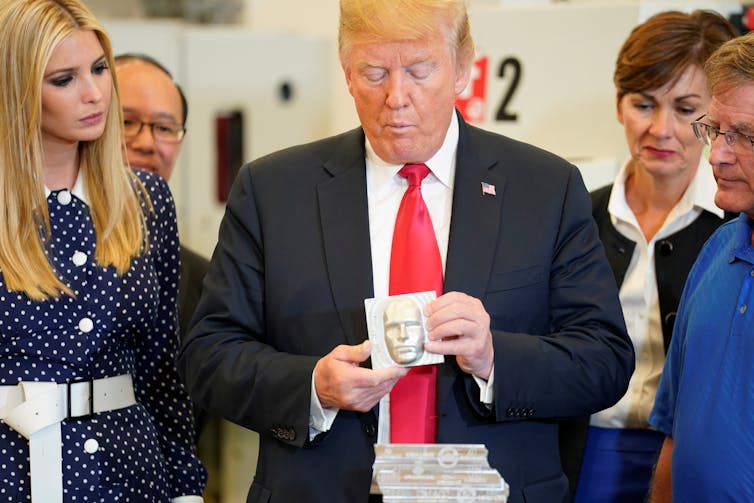Trump should wage a war on waste instead of battling the world over trade
- Written by Clyde Eiríkur Hull, Professor of Management, Rochester Institute of Technology
President Donald Trump is fighting the wrong fight in his ongoing trade war[1] with the rest of the world.
That’s because it’s premised on the old-school notion of the linear economy in which someone in another country, such as China, digs up raw materials and sends them to a factory, where they get turned into the finished product and shipped to the U.S. In exchange, money leaves the U.S. economy[2] and flows to the countries where the product was made – creating the trade deficit Trump despises[3].
And here’s the important bit. Americans use the product for a while, throw it away, and it ends up in a dump. And then we buy another import.
The long-term effect? Our money goes to a foreign economy, and Americans end up with piles of garbage. Then we pay a foreign economy one more time to take the garbage off our hands[4]. China is one country that used to take a lot of our garbage, but India, Pakistan and Nigeria[5] are also big in this business.
A circular economy, by contrast, starts with the finished product, which can then be recycled domestically and reused, often at a fraction of the cost of manufacturing them new elsewhere[6]. This keeps the money at home[7], which produces more domestic jobs and wealth.
As a researcher of corporate social responsibility, I’ve been exploring[8] whether consumers are willing to buy more goods that have been remanufactured. My research suggests the answer is yes – if companies can figure how to produce more of them. And that’s where Trump and the federal government could play a big role.
Companies leading the charge
For now, companies and others in the American private sector are trying to lead the way, such as construction and mining equipment maker Caterpillar and automaker General Motors.
Caterpillar, for example, currently remanufactures 85 million tons[9] of material a year, while GM has 142 manufacturing and other facilities that don’t produce any garbage[10] by recycling, reusing or converting all waste to energy. GM also participates in a new online exchange[11] that has about 1,000 partner companies buying and selling their recycled waste as raw material.
The nonprofit sector has also been playing a role, both in terms of research and practical efforts. Since 1991, the Center for Remanufacturing and Resource Recovery[12] at my own Rochester Institute of Technology in upstate New York, for example, has been working with organizations such as the U.S. Marines Corps and Staples to take advantage of circular economy principles.
The center helped the Marines remanufacture defective drive shafts[13] for light armored vehicles, which has saved the military force 78 percent versus the cost of buying them new. It also partnered with Staples to cut the use of non-recycled materials in office furniture by almost 90 percent while reducing the cost to the customer by over 40 percent.
 The U.S. could reuse more of their plastics, like Kenya did when they sailed the first dhow boat made entirely of recycled plastic.
Reuters/Baz Ratner[14]
The U.S. could reuse more of their plastics, like Kenya did when they sailed the first dhow boat made entirely of recycled plastic.
Reuters/Baz Ratner[14]
Benefits of circular logic
The benefits can add up quickly.
General Motors, for example boasts revenue and savings[15] of US$1 billion a year from its circular economy initiatives.
That’s just one company. Scaling up could yield over $1 trillion a year[16] in savings globally – and that’s just in terms of mining and processing fewer raw materials. More broadly, were the European Union, for example, to replace all its imports with locally reused or recycled alternatives, it alone could generate[17] $300 billion to $600 billion a year in savings, according to a 2012 report by the Ellen MacArthur Foundation, a U.K. charity focused on promoting the transition to a circular economy.
Remanufacturing in the U.S. is already responsible for 180,000 jobs across sectors[18] as diverse as aerospace, consumer products, office furniture and retreaded tires. Given how much the U.S. currently imports from abroad[19] – and that remanufacturing is still less than 2 percent of total manufacturing in the U.S. – there’s room to create hundreds of thousands more jobs.
How Trump could help
While there are many ways the U.S. government could marshal its tremendous resources behind this effort, there are two in particular I think would pay dividends.
Both revolve around a core problem in remanufacturing: Most things we currently make can’t be remanufactured[20]. That’s partly because of social barriers — customers may confuse remanufactured with used, which is a very different thing — and partly because they’re not made to be remanufactured.
Plastics in particular pose a significant problem to moving toward a circular economy. Globally, we only recycle or reuse[21] about 9 percent of the plastic produced each year, with 79 percent going to landfills and 12 percent being burned.
Trump could support two ways to help solve this problem. Basically, with a carrot and a stick. The carrot involves setting a standard of design to ensure all products are made with future use in mind, as well as using his influence to encourage Americans to buy goods remanufactured in the U.S.
The stick is tax policy. Specifically, the government could tax products that can’t be converted into raw materials after they are used, as well as those that are made with less than a certain percentage of reused components – a minimum that would be set to gradually increase. Money raised through this tax could be used to support research into remanufacturing, community efforts to reach higher recycling and reuse targets, or other purposes.
 Trump toured the advanced manufacturing lab at Northeast Iowa Community College in Peosta, Iowa.
Reuters/Joshua Roberts[22]
Trump toured the advanced manufacturing lab at Northeast Iowa Community College in Peosta, Iowa.
Reuters/Joshua Roberts[22]
Remanufacturing for the win
Some countries are already reducing their imports by going circular, putting the United States at risk of falling behind.
China, for one, has been systematically expanding[23] its efforts in this area for over 20 years, while the EU is beginning[24] to invest in a circular economy as well with a formal action plan, most recently revised in 2015[25].
In an entirely circular economy, the U.S. would most likely still import stuff from abroad, such as steel from China. But that steel would wind up being reused in American factories[26], employing tax-paying American workers to manufacture new goods.
In other words, the more circular Americans make their economy, the fewer products they’ll wind up importing and the more things that could bear the “Made in the USA” label.
References
- ^ trade war (theconversation.com)
- ^ money leaves the U.S. economy (www.washingtonpost.com)
- ^ trade deficit Trump despises (www.nytimes.com)
- ^ a foreign economy one more time to take the garbage off our hands (www.google.com)
- ^ India, Pakistan and Nigeria (www.sciencedirect.com)
- ^ a fraction of the cost of manufacturing them new elsewhere (circularfoundation.org)
- ^ keeps the money at home (circularfoundation.org)
- ^ I’ve been exploring (doi.org)
- ^ remanufactures 85 million tons (www.rit.edu)
- ^ that don’t produce any garbage (media.gm.com)
- ^ online exchange (pathway21.com)
- ^ Center for Remanufacturing and Resource Recovery (www.rit.edu)
- ^ remanufacture defective drive shafts (www.rit.edu)
- ^ Reuters/Baz Ratner (pictures.reuters.com)
- ^ boasts revenue and savings (www.greenbiz.com)
- ^ $1 trillion a year (thebusinessleadership.academy)
- ^ could generate (circularfoundation.org)
- ^ 180,000 jobs across sectors (www.rit.edu)
- ^ U.S. currently imports from abroad (www.bea.gov)
- ^ can’t be remanufactured (www.rit.edu)
- ^ we only recycle or reuse (www.doi.org)
- ^ Reuters/Joshua Roberts (pictures.reuters.com)
- ^ has been systematically expanding (doi.org)
- ^ EU is beginning (doi.org)
- ^ most recently revised in 2015 (eur-lex.europa.eu)
- ^ reused in American factories (www.greenbiz.com)
Authors: Clyde Eiríkur Hull, Professor of Management, Rochester Institute of Technology

